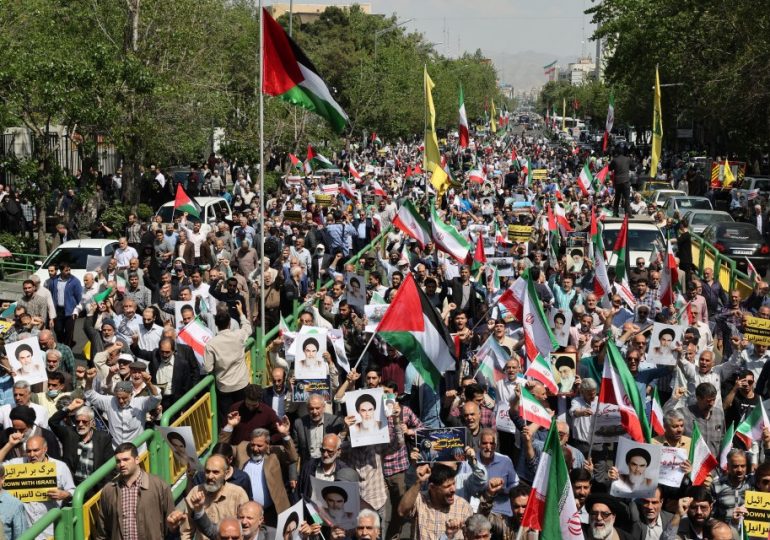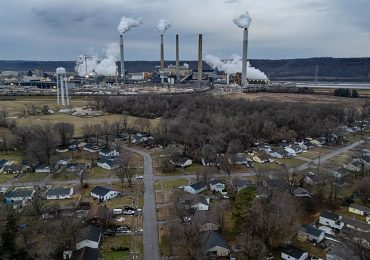IRANIANS chanted “Death to America, Death to Israel” during a massive march in Tehran in support of last weekend’s revenge strike.
Thousands took to the streets of Iran’s capital on Friday to celebrate the destruction of one of Israel’s nuclear base radars, despite an earlier announcement of explosions in the centre of the country.
AFPThousands paraded Tehran’s streets in support of Iran’s strike on Israel[/caption]
AlamyIranians held signs that read ‘down with Israel’[/caption]
AlamyThere were also signs that read ‘down with USA’ following their intervention on Iran’s strike last week[/caption]
Friday’s demonstrations dispersed shortly after prayers and many people around the city flocked to Tehran’s parks to enjoy the spring weather while others went hiking in the mountains.
State media reported detonations were heard after “several” drones were “successfully shot down” by Iran’s “anti-aircraft defence system”.
However, US media quoted officials there as saying Israel had carried out strikes in retaliation for Tehran’s drone and missile barrage fired last weekend.
Three missiles were fired from Israeli fighter aircraft outside of Iran in Friday morning’s very limited strike, according to a senior U.S. official.
The Israelis were targeting an air defence radar site near Isfahan that’s part of the protection of the Natanz nuclear facility, the official said.
The first assessment is that the strike took out the site, but assessment hasn’t been completed, the official added.
Israel now believes it has Iran locked in a strategic chokehold following Friday’s revenge strike – and there could be more to come.
Reports have surfaced that Tel Aviv may have launched the attack as a “trap” to “test the waters” before unleashing its full revenge on Tehran.
But Iran’s Tasnim news agency quoted “informed sources” as denying the explosions were an attack from abroad.
Even President Ebrahim Raisi made no mention of the blasts when he gave a speech in Semnan province east of Tehran.
Flights over Iran were briefly suspended following the explosions, but later resumed as scheduled.
Bahar, 24, an instructor who works with children, said she only heard about the explosions from a friend living abroad.
Speaking from Isfahan province, where the early morning blasts were heard, Bahar said: “We’re going to the park to play board games. Everything is just like before.
“It’s just like a normal Friday morning,” she added.
Some people did express concern about the prospect of an expanding conflict, however.
“War is a destructive thing, it is troublesome for everyone,” said Mohsen, a 60-year-old taxi driver in the capital.
“The whole world wants peace and comfort.”
The explosions took place almost a week after Iran launched its first-ever direct retaliatory attack on Israel.
Along with the United States and other allies, Israel intercepted most of the more than 300 missiles and drones launched by Iran.
Only minor damage was reported in Israel, and there were no fatalities.
Iran’s aerial attack on Israel
IRAN launched an unprecedented aerial barrage on Israel overnight on Saturday April 13.
BY ELLIE DOUGHTY
In the first attack of its kind, Iran hurled 110 ballistic missiles, 36 cruise missiles and 185 attack drones across Middle Eastern airspace.
Between Israel’s impressive Iron Dome air defence system and allied efforts from the UK and US, Tehran’s attack was largely thwarted.
At least four Typhoon fighters took out some of the weapons bound for Israel after scrambling from the RAF Akrotiri base in Cyprus.
Israeli President Isaac Herzog described the ambush as a “declaration of war”.
Despite worldwide calls for cool heads to prevail, Netanyahu’s ranks repeatedly insisted that a retaliatory strike would be the only response.
IDF spokesman Rear Admiral Daniel Hagari said: “We cannot stand still from this kind of aggression, Iran will not get [off] scot-free with this aggression.
“We will respond in our time, in our place, in the way that we will choose.”
Iran’s Supreme National Security Council vowed to hit back against Israel if a counter-attack was launched.
US president Joe Biden, said to privately fear a catastrophic escalation in the Middle East, pushed Netanyahu to call off an immediate retaliation on Saturday night.
Israel’s war cabinet then spent days locked in crunch meetings and quickly approved plans for an “offensive” but the timing and scale remained murky.
Despite Israel claiming otherwise, the US made clear that it would not contribute to a revenge hit against Iran.
However, a young girl hit by fragments of an intercepted Iranian missile is fighting for her life in hospital.
Iran’s attack came in response to a strike in Damascus which levelled the five-storey consular annexe of the Iranian embassy and killed seven Revolutionary Guards, two of them generals, on April 1.
Following its drone and missile barrage attack, Iran said it deemed the matter concluded and Raisi warned Israel against the “slightest action”.
Friday’s explosions, however, prompted world leaders to appeal for calm and de-escalation as Israel-Iran tensions spiked against the backdrop of the Gaza war which broke out on October 7.
Ali, a 48-year-old construction worker, told AFP he was angered by the possibility of an Israeli strike on Iran.
“Israel has no right to interfere in Iran,” he said. “If Israel wants to attack our country, our goal is to defend it.”
Retired firefighter Behrouz hoped for calm.
“We are against war, one way or another,” the 71-year-old said.
“We are not happy with the killing of people, whether they are Iranians, Israelis, or Gazans.”
AlamyIranians carrying more placards and chanting slogans during Friday’s anti-Israel rally in Tehran[/caption]
AFPMany held Palestine flags to show their solidarity for Gaza in its war with Israel[/caption]
AlamyVeiled Iranian women carry portraits of the Iranian supreme leader Ayatollah Ali Khamenei[/caption]
Leave a comment








